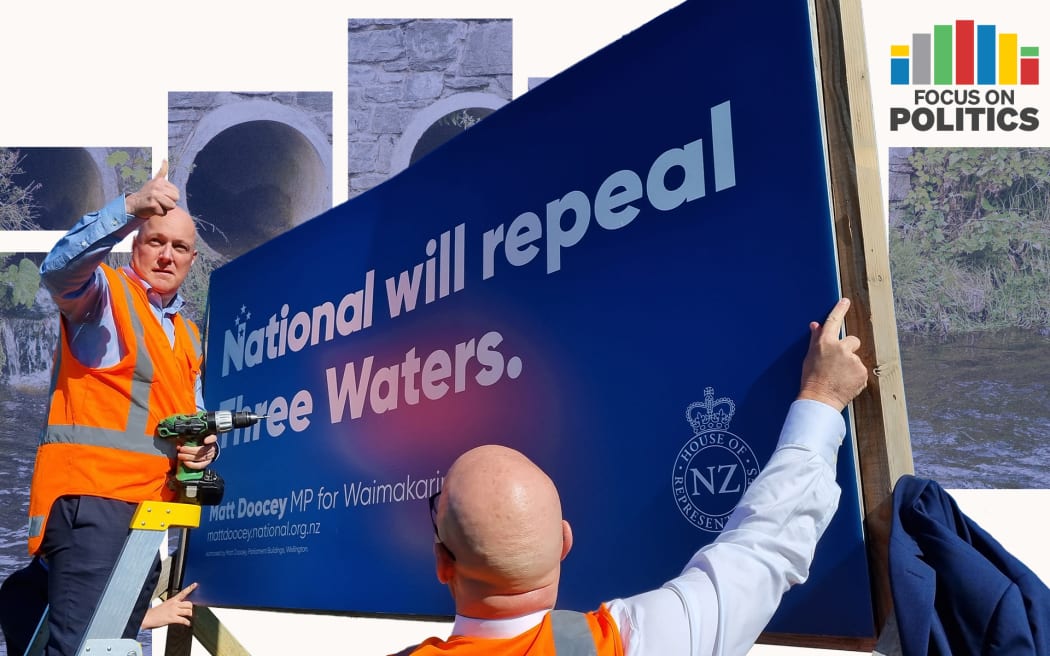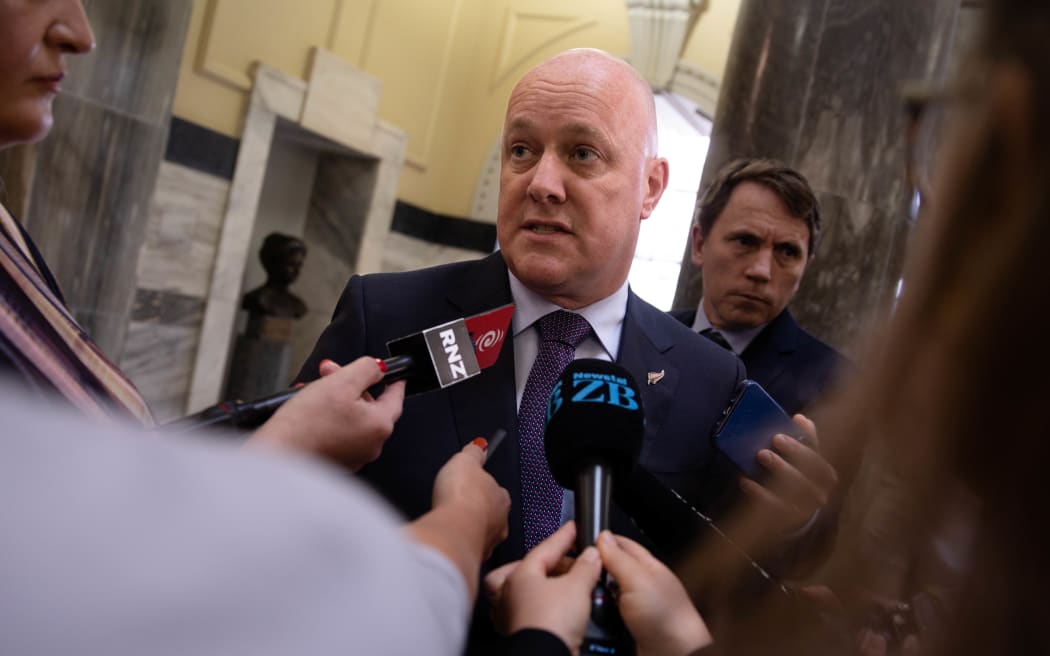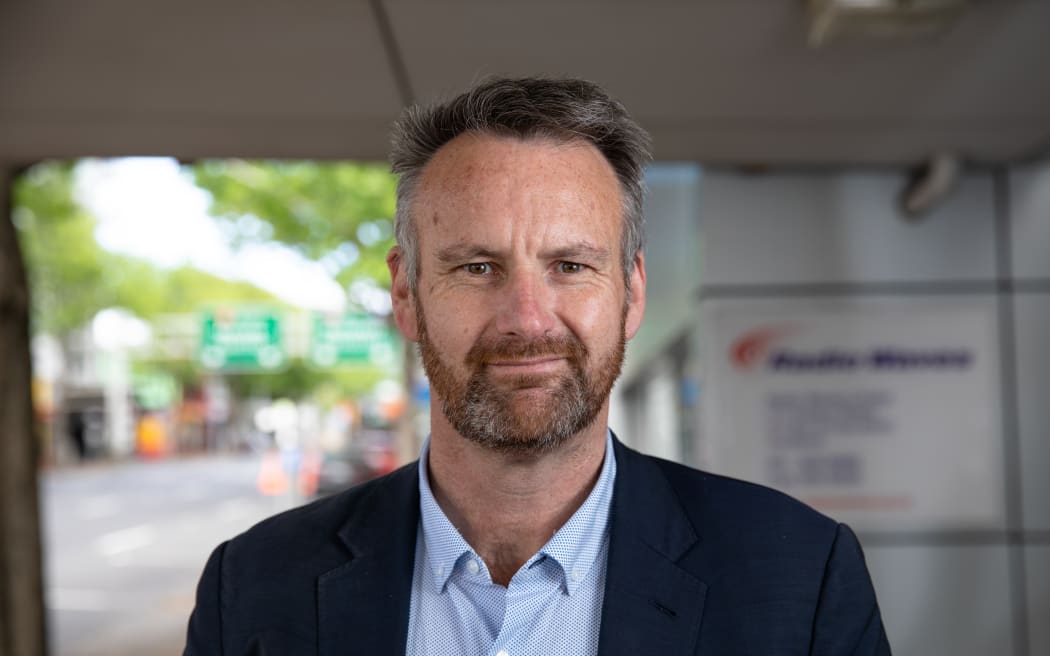
Photo: RNZ
"Let's be honest here: the magical thinking doesn't work. Someone has to pay in the long run" - Bernard Hickey
The National Party has long promised to "repeal and replace" the government's Three Waters policy, and until last Saturday it was vague on the specifics.
While their new solution may please the councils steadfastly opposed to Labour's plan, it remains plagued by a financial fishhook.
But - as journalist Bernard Hickey warns - Labour's plan, under review again by Chris Hipkins' new administration, is no done deal and still faces some complex political and monetary hurdles.
With the devastation of Cyclone Gabrielle still fresh, leader Christopher Luxon has unveiled their alternate plan to bring New Zealand's so-called Three Waters - drinking, storm and wastewater - infrastructure up to scratch.
Labour's plan would see councils' assets combined under four regional mega-entities, far enough removed from council control that they could borrow more, and more cheaply, than councils could alone.
These new organisations would be governed by boards, appointed by groups with a 50-50 split of Māori and council representatives: "co-governance".
National's proposal does away with that split, and leaves the assets under council control. Instead, councils would be required to ring-fence revenue for water services, meeting New Zealand's recently improved water quality standards while remaining financially sustainable.

National leader Christopher Luxon at Parliament. (file photo) Photo: RNZ / Angus Dreaver
Luxon says the government would step in where councils fail to achieve this, although exactly what this looks like is unclear - including any bail-out solution which would only see taxpayers forking out, and at the proverbial bottom of the cliff.
And while councils are in control, their options are limited: higher rates would mean eye-watering costs for ratepayers, and many councils are already near their borrowing limits.
National's preferred solution seems to be amalgamation but unlike Labour's policy it would be optional and remain largely under councils' control, a difference which has already won the backing of the Communities 4 Local Democracy group of councils which formed in opposition to the government's reforms.
This also faces the same problems the government did early on: councils that invested well in are typically unwilling to pay out to help their more poorly prepared neighbours, and the cost savings are limited unless they all sign on.
Questions remain over whether the smaller regional groupings could borrow as cheaply as Labour's bigger ones, and the freedom for councils means ongoing uncertainty for everyone else.
Read more:
- National pledges to scrap Three Waters and 'deliver local water well'
- Hipkins doubts councils can fix water under National's plan
- National's Three Waters plan fails to impress mayor
- Winners and losers: S&P on Three Waters impact for councils
- Focus on Politics: Co-governance debate heats up at Rātana, Waitangi
- Focus on Politics: Three waters on the boil as elections loom
- Politicians weigh in on Rob Campbell's comments about National's Three Waters policy
- Rob Campbell 'very disappointed' over removal as EPA chair
Journalist Bernard Hickey, who writes for his The Kākā substack, says National's plan removes some politically uncomfortable aspects of Labour's plan, but sends the difficult bits back to councils without really helping them.
"Neither National or Labour's version of central government would help councils much with this massive infrastructure financing problem we've got - not just in the future but to catch up on the $100 billion that we haven't invested in the past."
He says the fundamental problem with funding long-term public infrastructure is councils need to pay at least half of the cost needed to deal with the growth in population.
"All they have is rates and few parking charges and library book charges to pay for it. The beneficiary of all the population growth is central government, with GST and income tax receipts, so you have a horrible alignment of incentives here.

Bernard Hickey Photo: RNZ / Dan Cook
"People want to have the infrastructure but not pay for it themselves. They want to have the population growth but not have the infrastructure to go with it. Come on guys, let's be honest here, the magical thinking doesn't work: someone has to pay in the long run."
He says the Local Government Funding Agency run by Treasury allows councils to borrow more cheaply - but also limits councils in how much they can borrow.
"The reason for that is Auckland is the main borrower, and if it decided to borrrow a lot more and deliberately drop a notch in its credit rating some fear that would mean we've have a drop in [New Zealand's] sovereign credit rating as well.
"Things need to be pushed forward. National don't want to do it because it's politically difficult. Labour have tried to do it through Three Waters - which was essentially to create an apolitical vehicle in the middle - and unfortunately for Labour, got bound up in this reaction, quite visceral reaction, against co-governance."
Labour, under Hipkins, has put its proposal under review with Local Government Minister Kieran McAnulty expected to provide options on a rework soon.
Some have suggested this could include doing away with co-governance but Hickey says that would also be a problem for the party: it would mean undoing their own already-passed legislation, damaging their relationship with Māori, and in the case of a close election potentially scuttling a crucial coalition negotiations with Te Pāti Māori.
What's more, ratings agency Standard & Poor's told him this week time was running short on getting permission to swap the debt to bonds held by the new entities.
"So Three Waters is in a lot of trouble not just because of the politics, but because of the actual mechanics of unraveling the assets, connecting them up with new debt and getting permission from existing debt-holders - who aren't government bodies - to this arrangement."
Hickey suggests there could be a middle ground between National and Labour, in which councils retain ownership and borrow their share - whatever that may be - meaning higher rates and debt.
The government would then provide its own share of the cash "and avoid this really messy and fudgy off-balance-sheet-vehicle thing which actually doesn't solve the problem that Labour thinks it was going to solve".
In this week's Focus on Politics Deputy Political Editor Craig McCulloch and Political Editor Jane Patterson tally the relative merits of each policy, and hear from Hickey what a middle ground could look like.
Listen free to Focus on Politics on Apple Podcasts, on Spotify, on iHeart Radio or wherever you get your podcasts.



